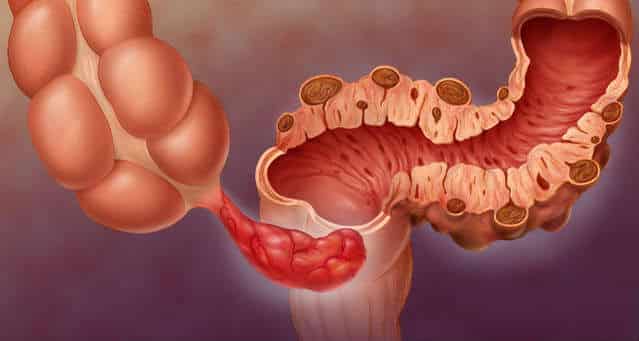Unraveling the Hidden Triggers: Unveiling Causes and Holistic Solutions for Diverticulitis and Diverticulosis
from web site
Diverticulitis and diverticulosis , two closely related gastrointestinal conditions, have become more prevalent in recent years, leading to an increased demand for information about their causes and potential natural remedies. Characterized by the formation of small pouches, known as diverticula, in the lining of the colon, these conditions can cause discomfort, pain, and various digestive issues. While the exact triggers for diverticulitis and diverticulosis are not yet fully understood, researchers have identified several important factors that contribute to their development. In this article, we aim to unravel the hidden triggers behind diverticulitis and diverticulosis and explore holistic solutions that can help individuals manage and potentially prevent these conditions. By deciphering the causes and offering natural remedies, we hope to empower readers to make informed choices that can improve their overall digestive health and well-being.
Causes of Diverticulitis
Diverticulitis is a condition characterized by the inflammation or infection of small pouches called diverticula that develop in the lining of the intestines, especially the colon. While the exact cause of diverticulitis is not fully understood, several factors have been associated with its development.
Low Fiber Diet: One of the primary causes of diverticulitis is a diet low in fiber. When we don't consume enough fiber-rich foods, our digestive system struggles to effectively process waste, leading to increased pressure in the colon. This pressure can result in the formation of diverticula, which may become infected or inflamed, causing diverticulitis.
Age: Age is another significant factor that contributes to the development of diverticulitis. The condition is more common in individuals aged 40 years and above. As we age, the walls of our intestines naturally weaken, making the formation of diverticula more likely.
Lifestyle Factors: Certain lifestyle habits can also play a role in the occurrence of diverticulitis. Factors such as smoking, obesity, and lack of physical activity have been linked to an increased risk of developing the condition. These behaviors can contribute to digestive issues and place added strain on the intestinal walls, making them more susceptible to diverticula formation.

By understanding the potential causes of diverticulitis, we can make informed choices to reduce our risk. Introducing a diet high in fiber, engaging in regular exercise, and adopting healthy lifestyle habits may help prevent the occurrence or recurrence of diverticulitis episodes.
Risk Factors and Symptoms
Diverticulitis is a condition characterized by inflamed or infected pouches called diverticula that form in the lining of the colon. Understanding the risk factors and recognizing the symptoms is crucial for early detection and management of this condition.
Risk Factors:
Several factors can increase the likelihood of developing diverticulitis. The most common risk factor is age, with individuals over the age of 40 being more susceptible. Additionally, a low-fiber diet is known to contribute to the formation of diverticula. Lack of physical activity, obesity, and smoking are also associated with an increased risk. Lastly, certain medications such as nonsteroidal anti-inflammatory drugs (NSAIDs) and steroids may worsen the condition.Symptoms:
Diverticulitis can present with various symptoms, although some individuals may not experience any signs of the condition. Abdominal pain is one of the primary symptoms, often located on the left side of the lower abdomen. This pain can be persistent or intermittent and may worsen with movement or pressure. Other common symptoms include bloating, constipation or diarrhea, nausea, and vomiting. In severe cases, fever, chills, and rectal bleeding may also occur. It is essential to consult a healthcare professional if these symptoms arise or persist.Seeking Medical Attention:
Although diverticulitis shares similarities with other digestive disorders, early diagnosis is crucial for effective management. If any of the mentioned symptoms manifest, it is advisable to seek medical attention promptly. A healthcare provider will conduct a physical examination, inquire about symptoms, and may recommend further tests such as bloodwork, imaging studies, or a colonoscopy to confirm the diagnosis. Engaging in open and honest communication with your healthcare team is vital to receiving appropriate treatment and creating a tailored management plan.
Remember, recognizing the risk factors and symptoms of diverticulitis can significantly contribute to timely intervention and improved outcomes. Stay vigilant and take proactive measures to maintain a healthy lifestyle that includes a well-balanced diet rich in fiber, regular exercise, and avoidance of risk factors such as smoking.
Holistic Approaches for Managing Diverticulitis
Diverticulitis can be effectively managed using holistic approaches that focus on natural remedies and lifestyle changes. By incorporating these methods into your daily routine, you can promote healing, alleviate symptoms, and prevent future flare-ups.
Dietary Modifications: A key aspect of managing diverticulitis holistically is adopting a diet that supports digestive health. Including high-fiber foods such as fruits, vegetables, whole grains, and legumes can help regulate bowel movements, prevent constipation, and reduce the risk of diverticula inflammation. Additionally, drinking plenty of water is essential to maintain hydration and ensure proper digestion.
Stress Reduction: Stress has been linked to various digestive disorders, including diverticulitis. Managing stress through techniques like meditation, deep breathing exercises, and regular physical activity can help reduce inflammation and promote overall well-being. Engaging in activities that you enjoy and finding time for relaxation can also contribute to stress reduction.
Natural Supplements: Certain natural supplements have been found to provide relief and support the healing process for diverticulitis. Probiotics, for example, can help restore a healthy balance of bacteria in the gut, while herbs like slippery elm and marshmallow root may soothe the digestive tract. It is always advisable to consult with a healthcare professional before incorporating any supplements into your routine to ensure they are safe and suitable for you.
By adopting holistic approaches and making sustainable lifestyle changes, individuals with diverticulitis can effectively manage their condition and improve their overall quality of life. Remember, it is essential to work closely with a healthcare professional to develop a personalized treatment plan that meets your specific needs.
